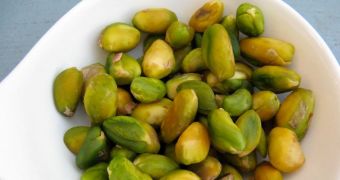Specialists with the Pennsylvania State University in the US now say that, according to their investigations into the matter at hand, eating pistachios on a regular basis can yield significant health benefits.
Simply put, these researchers maintain that, all things considered, those who decide to include such nuts in their daily diet are likely to have a lower heart disease risk than those who choose to only eat pistachios every once in a while.
By the looks of it, people who have been diagnosed with diabetes should first and foremost get into the habit of feasting on pistachios on a daily basis, the specialists argue in a paper in the Journal of the American Heart Association.
In this paper, the Pennsylvania State University researchers detail that, as shown by previous investigations, type 2 diabetes patients are more likely to develop one heart disease or another at some point in their lives.
Pistachios help reduce this risk by protecting both the heart and blood vessels in the body against the potentially harmful effects of prolonged exposure to stress, the scientists write in a press release detailing this investigation.
As explained by Sheila G. West, a professor of behavioral health and nutritional sciences, “In adults with diabetes, two servings of pistachios per day lowered vascular constriction during stress and improved neural control of the heart.”
Furthermore, “Although nuts are high in fat, they contain good fats, fiber, potassium and antioxidants. Given the high risk of heart disease in people with diabetes, nuts are an important component of a heart healthy diet in this population.”
The claim that eating pistachios can help reduce heart disease risk in type 2 diabetes patients is based on data obtained while carrying out a series of experiments with the help of volunteers who, despite having been diagnosed with this condition, were in fairly good health.
After putting these volunteers on a strict diet and closely monitoring their meals, the researchers found that, when made to eat two servings (i.e. 3 ounces / 85 grams) of pistachios per day, they experienced an improvement in their overall health of their circulatory systems.
“After the pistachio diet, blood vessels remained more relaxed and open during the stress tests,” Sheila G. West said in a statement. “We found that systolic blood pressure during sleep was particularly affected by pistachios. Average sleep blood pressure was reduced by about 4 points and this would be expected to lower workload on the heart,” she added.
As encouraging as the outcome of this investigation might be, the fact remains that eating pistachios does not a proper way to handle day-to-day stress make. Thus, Sheila G. West and fellow researchers wish to stress that nuts cannot count as a cure for the harmful effects that stress more often than not has on the human body.

 14 DAY TRIAL //
14 DAY TRIAL //